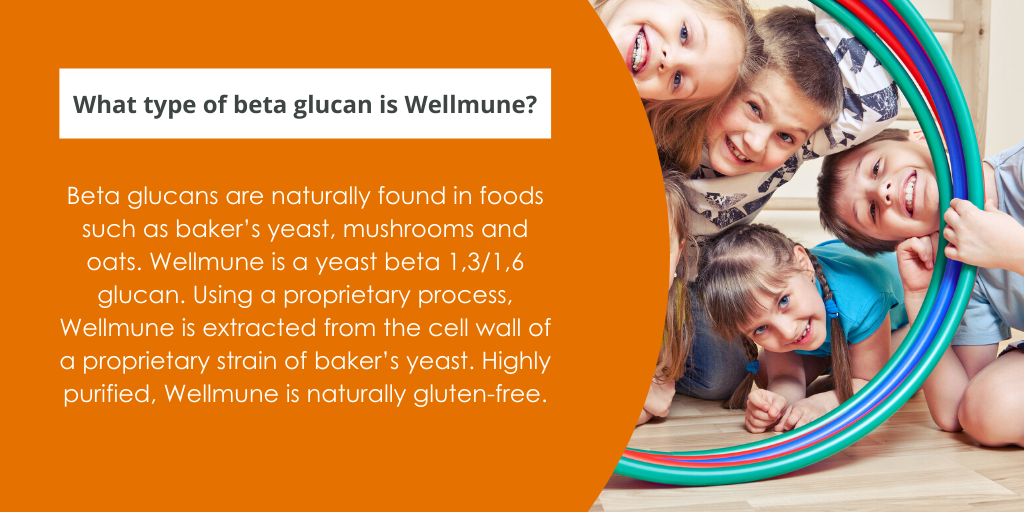What is a Yeast Beta Glucan? And How Does it Support Immunity?
When you’re considering ways to support your immune health, the options on the market are vast. From echinacea to zinc, the choices can be overwhelming—and often reflective of the latest trending health news. One trend—oat- and mushroom-derived beta glucans—has been associated with a myriad of health benefits, including lowering cholesterol and improving heart health—and in some cases, supporting immune system function. But only yeast-derived beta glucans (Saccharomyces cerevisiae) have been shown to have well-substantiated immune-supporting properties.
When it comes to beta glucans, the differences matter. Read on to learn more.
What are the differences between beta glucans?
Oats. Mushrooms. Yeast. It sounds like a grocery list for a trendy bistro. What all these ingredients have in common is that they are types of beta glucans. But the similarities end there. Not only are these three types different on a molecular level, but they have differing effects on the body as well. Although each of these types of beta glucans may provide health benefits, the benefits differ, depending on the type of beta glucan.
- Oats. Oat-based beta glucans are notable for promoting heart health and helping manage LDL (bad) cholesterol. But scientific evidence does not strongly support this type of beta glucan for enhancing immune system function. So while keeping your heart functioning and cholesterol levels in check are important in preserving health, oat beta glucans can’t help ward off threats to immune health.
- Mushrooms. Although mushroom beta glucans have been shown to have immune health benefits, research indicates that their potency is lower than that of certain well-studied baker’s yeast beta glucans. Because there are countless undiscovered species of mushrooms—and among the known types, research on benefits is mixed—they may not be the best overall choice for immune support.
- Yeast. Yeast-derived beta glucans usually originate in either baker’s yeast or brewer’s yeast. Even though both are beta 1,3/1,6 glucan from Saccharomyces cerevisiae, the source matters—the beta glucans extracted from the cell walls of baker’s yeast have a different molecular pattern from that of brewer’s yeast, which can influence the immune-modulating abilities of the final product. Research supports the immune-modulating properties of baker’s yeast beta glucan—but not all strains are the same.
When evaluating a baker’s yeast beta glucan for its benefits, look for clinical research that supports the ingredient’s mechanism of action and provides data that demonstrates its safety and effectiveness. A recent study emphasizes that research must be specific to that ingredient (or strain) and its process of extraction, because these attributes make a difference in effectiveness.
Get to know Wellmune®, a yeast beta glucan that supports immune system health. Watch the video to learn more.
What makes a quality beta glucan?
How do you know that a yeast beta glucan ingredient is the best choice for supporting immune health? Basically, it comes down to three factors: how it works, how it’s made, and standardization.
- How it works: High-quality beta glucans are supported by a well-developed understanding of an ingredient’s biological activity, and its mechanism for action in the body. Each beta glucan source has a different structure (molecular backbone and level of branching), which affects its biological activity. As an example, take baker’s yeast beta glucans, which are extracted from the cell walls of yeast. Certain strains, like Wellmune, have demonstrated immune health benefits which have been supported by clinical research.
- How it’s made: The manufacturing or processing methods used to extract the beta glucans can impact their structure. If the beta glucan’s structure is damaged or altered during the manufacturing process, the result could be a loss of measurable immune health benefits in the finished product.
- Standardization: Simply put, standardization is a process of confirming that the product being made contains the right amount of an ingredient in the right quantity to provide a benefit. To ensure that the ingredient is stable and works well, manufacturers must ensure standardization. Standardization helps product makers establish serving size, manufacturing consistency, and stability of the product.
Wellmune, a proven yeast beta glucan.
Wellmune is a unique yeast beta glucan used by food, beverage and supplement brands to create products with immune health benefits for people of all ages. Using a proprietary process, Wellmune is extracted from the cell wall of a proprietary strain of baker’s yeast.
Wellmune can help support immune system functioning with research-backed benefits. Watch the video to learn how it works.
Wellmune works by supporting the action of innate immune cells. Innate immune cells recognize foreign substances like viruses, and prime these cells to fight an infection or inflammation. The overall effect is to “prime” the immune system to act more efficiently, rather than “boost” it.
Wellmune is well-researched.
Wellmune is supported by biomarker, mechanism-of-action, and over a dozen published, peer-reviewed human clinical research studies that demonstrate its ability to improve overall physical health, maintain healthy energy levels, and provide immune support for all ages and lifestyles including:




